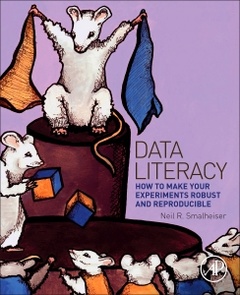Data Literacy How to Make Your Experiments Robust and Reproducible
Auteur : Smalheiser Neil

Data Literacy: How to Make Your Experiments Robust and Reproducible provides an overview of basic concepts and skills in handling data, which are common to diverse areas of science. Readers will get a good grasp of the steps involved in carrying out a scientific study and will understand some of the factors that make a study robust and reproducible.The book covers several major modules such as experimental design, data cleansing and preparation, statistical analysis, data management, and reporting. No specialized knowledge of statistics or computer programming is needed to fully understand the concepts presented.
This book is a valuable source for biomedical and health sciences graduate students andresearchers, in general, who are interested in handling data to make their research reproducibleand more efficient.
Part A: Experimental Design1. “Most published findings are false!2. How to identify a promising research problem?3. Experimental designs: measures, validity, randomization4. Experimental design: Sampling, bias, hypotheses5. Positive and negative controls
Part B: Getting a “feel for your data6. Refresher on basic concepts of probability and statistics7. Data cleansing8. Case studies of data cleansing9. Hypothesis testing10. The “new statistics11. ANOVA. 12. Nonparametric tests13. Other statistical concepts you should know
Part C: Data Management14. Recording and reporting experiments15. Data sharing and re-use16. Publishing
- Presents the content in an informal tone and with many examples taken from the daily routine at laboratories
- Can be used for self-studying or as an optional book for more technical courses
- Brings an interdisciplinary approach which may be applied across different areas of sciences
Date de parution : 09-2017
Ouvrage de 282 p.
19x23.3 cm
